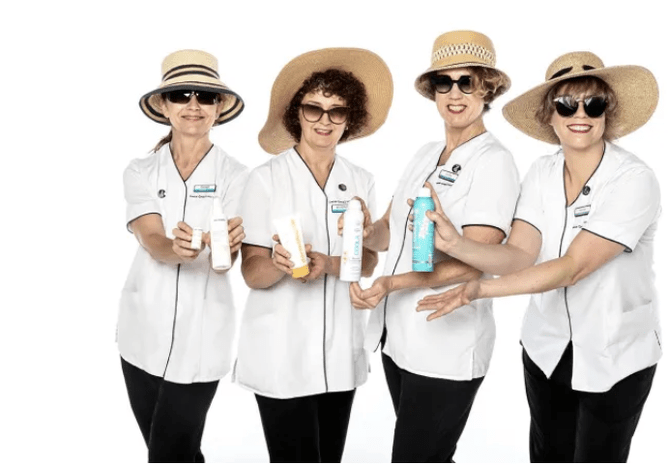They’re strong words, but it is really that simple. Sunburn is lethal to the skin.
Join Louise as she breaks things down for us:
First of all – the sun’s rays
In a nutshell, the sun sends out ultraviolet rays A, B, and C. UVA are known as the ageing rays, UVB the burning, and UVC rays don’t get through the ozone layer.
The allure – the biochemical effects of the sun
The sun has an eternal allure for humans, and it’s not difficult to appreciate why. The warmth on our skin is like a luxurious balm, but it goes deeper than that. Biochemically it changes our brain chemistry meaning that basking in sunlight for a few moments gives us a feeling of well-being through a boost in endorphins.
Feeling the burn – and yes, it truly is burning!
It all goes belly-up when we overdo it and our skin raises the alarm. If we don’t listen, our skin will, quite literally, burn. Sunburn is the skin’s natural response to extreme UV ray exposure and indicates severe damage.
The risks
Sun damage brings the risk of skin cancer and prematurely aged skin. There are different types of skin cancer — some are treatable — but melanoma is insidious and life-threatening. We in New Zealand have the worst rates in the world.
Yes, you have heard it before: “Be sun smart”
We need to protect our skin from UV rays, every day, winter and summer, rain or shine. However, most people don’t. Nor do they use sunscreen correctly, which is liberally and often.
I often have clients come into the clinic and say, “These brown spots popped up overnight, but I wear SPF every day.” While it appears they’ve come out of nowhere, it’s cumulative damage coming to the surface.
So, we move on to sunscreen
Sunscreen is an involved topic, so let’s keep it simple and speak about the common terms:
What does chemical or physical mean?
Chemical sunscreens absorb UV rays and physical sunscreens reflect or scatter the rays.
What does broad spectrum mean?
UVA and UVB ray protection. The importance of using both cannot be emphasised enough.
What is SPF?
The Sun protection factor is a measure of how long a sunscreen will protect you. Always remember that it provides a screen, not a block.
Is a higher SPF better?
A sunscreen with an SPF 15 provides about 94% protection. Protection is increased to 97% with SPF 30 and to 98% with SPF 50+.
A sunscreen with SPF 15+ should provide adequate protection as long as it is being used correctly. Sunscreens with SPF 50 or more offer a safety margin as most people don’t apply sunscreens as heavily or as often as they should.
I suggest products with SPFs no lower than 30 and no higher than 50. Here are a few facts:
- The latest stats show that approximately 2,200 Kiwis are diagnosed with melanoma every year. That’s equivalent to six people being diagnosed with melanoma every day.
- It is also estimated that 80,000 Kiwis get non-melanoma skin cancer each year.
- Research has shown a correlation between childhood sunburn and sun damage in later life.
- Every day, all year round, is a sunscreen day. Even on cloudy days, 80% of UV gets through clouds.
As skincare professionals, we’re on the front line of skin safety. We have 22 different options on our shelves and we will find the right one for you.
Protect your skin – the reality is, there is no other option!
